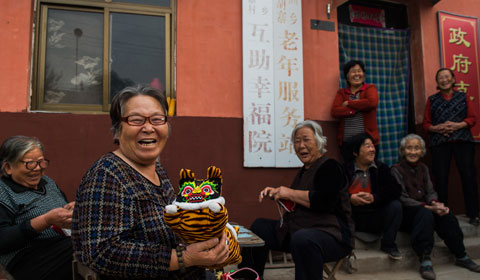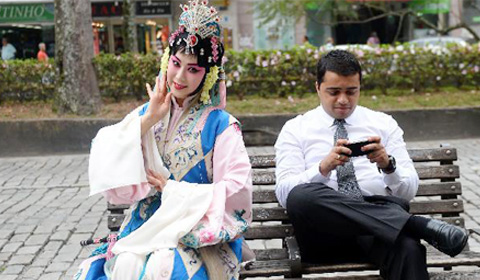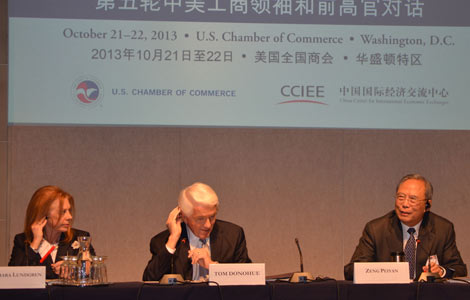Houston Zoo hosts Chinese interns
Updated: 2013-10-23 09:33
By Yu Wei in San Francisco (China Daily USA)
|
||||||||
With the rapid development of the zoo industry in China, there have come more and more exchanges between Chinese and the US zoo officials.
Liu Xiaoqing, director of animal management at the Guangzhou Zoo, and Tu Rongxiu, director of animal breeding and protection at the Shanghai Zoo, have been on a two-week working visit to the Houston Zoo that ends next Wednesday.
"The Houston Zoo made comprehensive arrangements for our visit," said Tu. "We were shown every animal exhibit in the zoo and got to see how each one works. We also met with officials from various departments to share experiences and exchange information and knowledge."
What's impressed Tu the most so far have been the zoo's programs in animal welfare and animal training. "The zoo is like an ecological park," she said, "with all of its exhibits set up as if the animals were living in their natural habitats.
"They've done a great job in animal training, such as animal decompression and treatment. The trainers demonstrate the processes to the public as well,' Tu said, adding that her zoo had carried out similar — though not as developed — training in 22 of its positions.
"We have much to learn from our hosts," Tu said.
Guangzhou Zoo's Liu said what the Houston Zoo has done will be what his zoo will aim for.
Houston "is doing an excellent job in animal enrichment, for instance giving tigers special scents to improve their sense of smell', Liu said. "In addition, the zoo gives the animals many more toys than Chinese zoos do."
Founded in 1922, the Houston Zoo — a 55-acre lush green park that houses more than 6,000 wild animals representing more than 800 species — was named one of the top 10 zoos in the US by Parents magazine in 2009.
David Brady, the Houston Zoo's chief marketing officer, said it is important for the zoo to exchange ideas with its Chinese counterparts, especially on topics such as animal enrichment, welfare and observation.
Brady said this was the first time they had ever hosted zoo officials from China. "I think it is great. Our staff met with them and worked with them, and have been very impressed by how much they care for the animals and how much they wanted to improve their animals' welfare," he said.
Brady hopes that there will be more communication between US and Chinese zoos in the future. "It would be great if zoos in the US could exchange visits with Chinese zoos and learn from each other,' he said. "I hope this is the beginning of a partnership for us to work together.'
Tu and Liu's visit is part of an internship program sponsored by the Humane Society International (HSI), the largest animal protection group in the US.
The internship exchange program was initiated last year when HSI wildlife department director Teresa Telecky attended a workshop in China, according to Peter H. Li, HSI's China policy specialist. "The aim is to provide Chinese zoo directors or senior staff a two-week internship at an accredited American zoo," he explained.
Li said the Chinese zoological industry has expanded exponentially in the last 30 years and Chinese zoological management and animal care have improved greatly.
"Zoos in the US have experiences and practices that reflect higher standards in zoo management, animal husbandry, veterinary service, visitor education, and conservation efforts," Li said. "The visiting Chinese zoo directors can also learn about areas in American zoos that need to be improved and can be avoided by Chinese zoos."
Contact the writer via Yuwei12@chinadailyusa.com
 Apple unveils new Macs, iPad ahead of holidays
Apple unveils new Macs, iPad ahead of holidays
 Smart cities to aid urbanization
Smart cities to aid urbanization
 In control & breaking the mold
In control & breaking the mold
 Higher retirement age may help solve pension problem
Higher retirement age may help solve pension problem
 Northeast remains shrouded in smog for third straight day
Northeast remains shrouded in smog for third straight day
 Beijing Opera troupe perform in Brazil
Beijing Opera troupe perform in Brazil
 Nature's masterpieces
Nature's masterpieces
 Riot police off to Libya peacekeeping mission
Riot police off to Libya peacekeeping mission
Most Viewed
Editor's Picks

|

|

|

|

|

|
Today's Top News
Iowa, Hebei sister state visit wraps up
NASA: Chinese scientists are now welcome
Solar-panel maker uses US baseball stars in campaign
Top officials promote new power relations
China's US Treasury holdings hit six-month low
Graduate looks at kung fu-hip hop connection
Apple unveils new Macs, iPad
San Francisco train service restarts after strike
US Weekly

|

|





